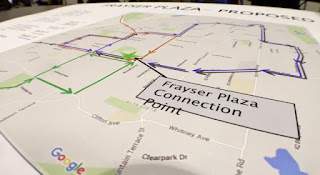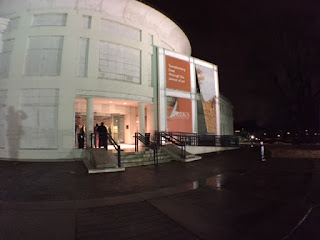Overton Park planning is not just about parking, MCIL demands access
By Tim Wheat

Most of the 250 people at the First Baptist Church on Broad Street were interested in Memphis Zoo parking and vehicle parking on the Overton Park Greensward. However; the company hired by the Overton Park Conservancy is also planning upgrades in accessibility to be part of the overall plan at Overton Park.
Steve Auterman, a senior associate at the architecture firm Looney, Ricks, Kiss pointed to an essential part of the framework for any changes in the park. Like complying with Code Enforcement, Auterman said that any solution also had a “duty of care to the public” who use the park. Part of this duty is compliance with the 1990 Americans with Disabilities Act.
“We have pushed off compliance to the ADA for a time in the Park,” Auterman said showing two slides with people using wheelchairs. “There are no accessible curb ramps. When I say the park must be accessible to everyone, I mean everyone.”
The balance of the public meeting was laying out parking solutions, but I felt it was clear that MCIL’s participation in the focus group and our request that inclusion of people with disabilities be a guiding principle for all renovations, and to remedy existing access issues in the park, was clearly heard by the planning group.
“This is not a park for all users,” said Steve Auterman said at the February 2 meeting at the Brooks Museum of Art. “If you use a wheelchair there are areas you cannot go.”
MCIL is determined to follow this process and work to include you in our advocacy. Please let the Center know how you feel about access in Overton Park.

The Commercial Appeal is reporting that MATA CEO Ron Garrison told a City Council Committee that our public transit system was about to break down
Garrison said to the City Council committee that MATA needs an additional $7 million in operating funds from the City of Memphis next fiscal year. Overall he said that MATA needs $30 million in operating funds and $5 million in capital funds to avoid cutting bus routes.
"As we get these funds;" the head of MATA told the Commercial Appeal, "we can actually bring MATA back from the dead."
Ron Garrison pronounced his responsibility dead without offering his resignation.
Additionally, MATA has said it is "planning" a return of the Trolleys to Memphis. The MATA plan however is costly without any date of success. Garrison said he'd like rail trolleys to run again here this spring but said "it's going to be much longer than that," noting it would be "foolhardy" to come up with a date for the trolleys' return.
At the same time MATA is foolhardily pursuing a multi-million dollar plan with no date of completion to return only half of the trolleys into service, the head of the system is begging for more money calling his responsibility collapsing and dead.
Public meeting on service changes fails to include people with disabilities

By Christina Clift
On Tuesday, February 9, 2016 the Memphis Area Transit Authority (MATA) held the first of three open houses for the public to look at proposed route changes. The meeting was held at the Benjamin L. Hooks Library from 4:00-8:00 PM. As a user of both MATA’s fixed route and paratransit system, I wanted to learn more about the proposed changes and discover how they might affect me. I felt excluded from the process; however, like a person looking in through a window from the outside.
This feeling of not being included or apart of the meeting was caused by two things. First, the event was set up in a manner in which I, as a blind person, could not easily navigate or interact. There were tables covered with printed maps of proposed route changes that I could not see. I also had difficulty locating who was in charge of the event to request assistance.
 During my wanderings in the meeting room I sat down next to a gentleman who works for the Department of Human Services Fraud Division and he felt just as confused. We both were waiting for a presentation to begin or for someone to give us direction on what was going to happen and when we were going to get started. But there was no presentation.
During my wanderings in the meeting room I sat down next to a gentleman who works for the Department of Human Services Fraud Division and he felt just as confused. We both were waiting for a presentation to begin or for someone to give us direction on what was going to happen and when we were going to get started. But there was no presentation.
Second, once I finally located some assistance from a gentleman named Gary, I felt like I was being rushed, that I was causing an imposition on his time, and my issues were unimportant. So, I didn’t get the answers that I really wanted to know. I left knowing only a bit more than I started. I knew that the number two, five, and forty routes were not going to change, but that the 57 and nine would. I hope that others had a better experience.
So how can this type of open house public meeting for MATA have been made better? They could ensure that there is a system in place to handle people who can’t see the maps. They should be able to answer questions from anxious riders who are possibly being impacted in a patient and friendly manner. Finally, they should perhaps incorporate a more structured approach in organizing future meetings. Having someone to ask if you need assistance when you sign in.

MATA looking to resolve inaccessibility issues
By Allison Donald
During the monthly meeting which was attended by Russell Jones, (chair) Bobbie Fields (secretary), Christina Clift (member), William Bass (member), Rexcey Bowers (member), Allison Donald (member), and Glenda Wade (MATA representative) issues regarding the lack of effective and accessible communication were addressed. The STAC committee was also informed on the status of Sandi Stanko and whether or not she was still employed by MATA.
Some riders have lodged complaints and tried voicing their concerns about the voicemail system set up, but MATAplus has failed to respond in a timely manner either with a written response or via phone. Allison Burton the Director of Marketing is in the process of training some to cover the complaint line. In accordance with that Glenda Wade and William Hussey (IT at MATA) will look into why the telephone system takes the caller and sometimes drops the call. Riders have also experienced being inadvertently cancelled which she also said she would look into.
The problems of effective communication and the lack of accessible informational material has resulted in Christina Clift filing a complaint against MATAplus with Disability Rights Tennessee. Christina Clift and Bobbie Fields are going meet with Ms. Wade Monday or Tuesday via phone to try and construct a plan that may lead to a resolution of some of the issues that continue to plague riders.
Ms. Wade also informed the members of the STAC committee that she was unsure of the status of Sandi Stanko. MATAplus is also in the process of hiring nineteen new divers and purchasing 15 new vehicles. Bobbie Fields and Ms. Wade are planning out the schedule so shadowing can begin.
The next STAC committee meeting will be held on March 3rd at 3:00 pm at the PVA on 1030 Jefferson. If you would like more information on the STAC committee and how to become a member you can contact Bobbie Fields or Christina Clift at 901-726-6404.
Disability Day on the Hill in Nashville

By Allison Donald
About 6,240 people are waiting to receive home and community based services in Tennessee, while 280,000 working Tennesseans are without healthcare, including 24,000 veterans and many people with disabilities. Tennessee must ensure that people with disabilities have access to quality, affordable healthcare.
During Disability Day on the Hill, Nashville becomes the epicenter for this conversation for advocates of people with disabilities and their representatives. These face-to-face meeting are essential in the fight to ensure that people with disabilities have access to quality, affordable healthcare.
I attended the Disability Day on the Hill from Memphis. Each representative that I visited pledged their support for legislation that would commit government resources to expand long term supports and services for all individuals with disabilities.
In conjunction with that, advocates are also asking for increased employment opportunities for people with intellectual and developmental disabilities. State data show that 83% of families consider employment in the community to be important for their family member in the community. There is also a strong push in favor of creating a waiver for individuals with developmental disabilities that is comparable to those with intellectual disabilities.
The time is now that the disability community of Tennessee hold these elected officials accountable so that people with disabilities may have access to affordable healthcare, viable employment and the creation of the developmental disabilities waiver.
Public Planning Meeting also deals with Accessability
By Tim Wheat
 Most people came to the Overton Park Planning public meeting Tuesday night at the Brooks Museum of Art concerning parking. The Memphis Center for Independent Living was part of the local focus groups and has suggested that the plan include access and accessible routs to all the Overton Park amenities. The MCIL statement asked that inclusion of people with disabilities be a guiding principle for all renovations, and to remedy existing access issues in the park.
Most people came to the Overton Park Planning public meeting Tuesday night at the Brooks Museum of Art concerning parking. The Memphis Center for Independent Living was part of the local focus groups and has suggested that the plan include access and accessible routs to all the Overton Park amenities. The MCIL statement asked that inclusion of people with disabilities be a guiding principle for all renovations, and to remedy existing access issues in the park.
“This is a beautiful thing,” said Tina Sullivan, the executive director of the Overton Park Conservancy who is a leading sponsor of the planning. “It means a lot of people are paying attention to this issue.”
The auditorium holds 250 people and the Brooks staff stood ready with umbrellas to assist people into the building. The Museum staff welcomed vistors and everyone was given a nice color print of the Overton Park map. Ms. Sullivan said that at least 50 people were turned away.
The capacity crowd at the Brooks Museum of Art hissed as the facilitator showed Memphis Zoo patrons parked on the Overton Park Greensward, but the public meeting was cordial. Steve Auterman spent most of the time Tuesday night explaining that the planning group hired by Overton Park anchor organizations that they are only gathering information in this initial phase. The zoo is not helping to fund the planning process.
Mr. Auterman and Chuck Flink of Alta Planning did most of the presentation to the crowd. They made no judgements and responded to questions written on cards by a select few in the audience. Access was one of the issues they were aware of and even used the example of people who use power wheelchairs as they addressed access around the park.
“This is not a park for all users,” said Steve Auterman of Looney Ricks Kiss design firm; “if you use a wheelchair there are areas you cannot go.”
If you would like to give input please visit the Overton Park website and take the survey. The final three questions will give you an opportunity to make suggestions.
http://www.overtonpark.org/2016/01/28/parking-feedback-online-survey











